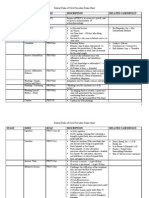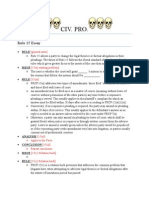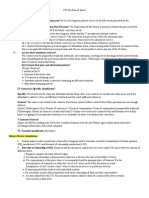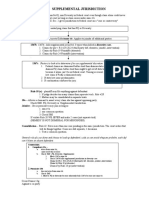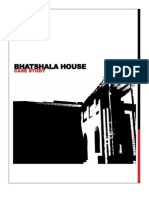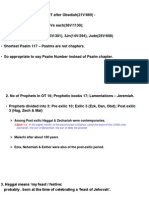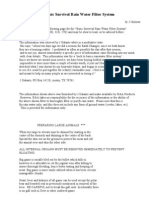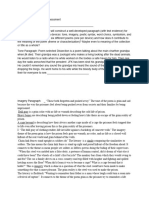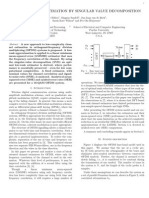FRCP 26 Chart
FRCP 26 Chart
Uploaded by
Ronnie Barcena Jr.Copyright:
Available Formats
FRCP 26 Chart
FRCP 26 Chart
Uploaded by
Ronnie Barcena Jr.Original Description:
Original Title
Copyright
Available Formats
Share this document
Did you find this document useful?
Is this content inappropriate?
Copyright:
Available Formats
FRCP 26 Chart
FRCP 26 Chart
Uploaded by
Ronnie Barcena Jr.Copyright:
Available Formats
Scope of FRCP 26(b): Is it discoverable?
FRCP 26(b)(1): FRCP 26(b)(2)(C): FRCP 26(b)(5) FRCP 26(b)(3): FRCP 26(c):
Parties may obtain
discovery regarding
any nonprivileged
matter that is
relevant to any
party's claim or
defense.
For good cause, the
court may order
discovery of any
matter relevant to
the subject matter
involved in the
action.
Relevant
information need
not be admissible at
the trial if the
discovery appears
reasonably
calculated to lead to
the discovery of
admissible evidence.
Discovery can be
limited by the court
if:
Discovery sought
is unreasonably
cumulative or
duplicative;
Discovery sought
is obtainable from
some other source
that is more
convenient, less
burdensome, or
less expensive;
The burden or
expense of the
proposed
discovery
outweighs its
likely benefits.
For policy reasons,
protection applies
even if information
sought is relevant to
litigation.
Common privileges:
Attorney-client,
Physician-patient,
5
th
Amendment
General requirements:
Communication must
have been made with
an expectation of
confidentiality;
Confidentiality is
essential to a socially
approved
relationship; and
Confidentiality has
not been waived by
disclosure to persons
outside of the
relationship.
Privileges can be
waived:
Only by the holder of
the privilege (or his
agent)
By disclosure to third
parties.
Intentional,
inadvertent and
implied waiver.
Trial Prep. & Work Product:
Are protected from discovery and need
not be produced EXCEPT:
o When the information contained in such
materials is not reasonably available
from any other source.
o NOT A PRIVILIGE.
To come within the qualified immunity
from discovery, three tests must be
satisfied. The material must be:
o Documents and tangible things prepared
in anticipation of litigation.
o To be protected, documents must be
primarily concerned with legal
assistance.
Subjective belief/objectively
reasonable.
o Doctrine applies to parties and their
agents.
To avoid application of the doctrine, a
party must show:
o That there is no reasonable alternative
source for the same or substantially
equivalent information and
o That the party has a substantial need for
the information.
If protection is overcome, attorneys
mental impressions and legal evaluations
need not be disclosed.
Party and witness statements are
discoverable by person making the
statement.
Waiver of protection occurs if protected
document is disclosed to another party
prior to trial.
Protective Orders:
Upon a showing of
good cause, court
may enter an order
to protect a person
from annoyance,
embarrassment,
oppression or
undue burden or
expense.
Good cause is
established by
factual evidence,
not conclusory
statements.
Party requesting
the protective
order has the
burden of showing
good cause for
same.
Court has to
balance
importance of the
information sought
to be discovered
against its
propensity for
annoyance,
embarrassment,
oppression or
undue burden or
expense.
Testifying Experts FRCP 26(a)(2) Non-Testifying Experts Fact Witnesses
90 days before trial must disclose identity and expected testimony and FRCP 26(a)(2)(A) list.
FRCP 26(a)(2)(C): Witnesses Who Do Not Provide a Written Report
o Unless otherwise stipulated or ordered by the court, if the witness is not required to
provide a written report, this disclosure must state:
The subject matter on which the witness is expected to present evidence under FRE 702,
703, or 705; and
A summary of the facts and opinions to which the witness is expected to testify.
Trial-Preparation Protection for Draft Reports or Disclosures:
o FRCP 26(b)(3)(A) and FRCP 26(b)(3)(B) protect drafts of any report or disclosure required
under Rule 26(a)(2), regardless of the form in which the draft is recorded.
Trial-Preparation Protection for Communications Between a Party's Attorney and Expert
Witnesses:
o FRCP 26(b)(3)(A) and FRCP 26(b)(3)(B) protect communications between the party's
attorney and any witness required to provide a report under FRCP 26(a)(2)(B), regardless
of the form of the communications, except to the extent that the communications:
Relate to compensation for the expert's study or testimony;
Identify facts or data that the party's attorney provided and that the expert considered in
forming the opinions to be expressed; or
Identify assumptions that the party's attorney provided and that the expert relied on in
forming the opinions to be expressed.
Limited discovery only
upon a showing of
exceptional
circumstances or
FRCP 35(b):
o Party upon whom a
FRCP 35 exam was
conducted waives
nondisclosure of its
non-testifying experts
because it requested a
copy of the examiners
report.
Mandatory
disclosures
FRCP
26(a)(3)(A)
You might also like
- Model Rules ChartDocument22 pagesModel Rules ChartRonnie Barcena Jr.100% (4)
- FRCP ChartDocument11 pagesFRCP Chartjcabral12100% (40)
- Joinder DiagramsDocument1 pageJoinder DiagramsBrat Wurst100% (3)
- Civ Pro Flow ChartsDocument32 pagesCiv Pro Flow Chartslonghorn77100% (13)
- Universal Mind Oracle Guidebook FINALDocument63 pagesUniversal Mind Oracle Guidebook FINALTuấn Anh Vũ80% (5)
- 1L Contracts Exam Outline Checklist Attack SheetDocument2 pages1L Contracts Exam Outline Checklist Attack SheetSara Zamani67% (3)
- Removal FlowchartDocument1 pageRemoval FlowchartzdayarNo ratings yet
- Remedies Flow ChartDocument1 pageRemedies Flow ChartJulie Song100% (5)
- Issue Preclusion: (No Fraud, Lack of SMJ, Venue, Joinder, Oppty To Be Heard Issues) No IpDocument8 pagesIssue Preclusion: (No Fraud, Lack of SMJ, Venue, Joinder, Oppty To Be Heard Issues) No Ipsgussack100% (4)
- Civ Pro Skeleton AnswersDocument5 pagesCiv Pro Skeleton AnswersWyattjames4100% (14)
- Essay Format Strict Product Liability (MFG)Document2 pagesEssay Format Strict Product Liability (MFG)Harley Meyer100% (1)
- Civil Procedure - Erie EssayDocument2 pagesCivil Procedure - Erie Essayjustgottabezen100% (1)
- Operator Manual Abbott Cell DYN EmeraldDocument310 pagesOperator Manual Abbott Cell DYN EmeraldIllusive Man91% (11)
- Civ Pro Flow ChartDocument8 pagesCiv Pro Flow Chartnhjefferson100% (2)
- Civil Procedure FRCP TableDocument20 pagesCivil Procedure FRCP TableIsaiah Paramore100% (2)
- CIV Pro Plan of AttackDocument3 pagesCIV Pro Plan of Attackrmthom100% (18)
- Civpro FlowchartDocument4 pagesCivpro FlowchartDawn J. Owens100% (7)
- Joinder of Claims ChartDocument1 pageJoinder of Claims ChartRonnie Barcena Jr.No ratings yet
- Joinder of Claims ChartDocument1 pageJoinder of Claims ChartRonnie Barcena Jr.No ratings yet
- Civ Pro Outline 2021Document71 pagesCiv Pro Outline 2021AmandaNo ratings yet
- Erie Doctrine Flow ChartDocument1 pageErie Doctrine Flow Chartdmt320100% (2)
- How To Write A Negligence Answer For Torts ExamDocument4 pagesHow To Write A Negligence Answer For Torts ExamPhillip Gordon MulesNo ratings yet
- 1L Torts OutlineDocument12 pages1L Torts Outlineac70119No ratings yet
- Rules Flow ChartDocument6 pagesRules Flow Chartmrgoldsmith23100% (7)
- Group Organics OD PractitioinerDocument8 pagesGroup Organics OD PractitioinerPrateek HegdeNo ratings yet
- FRCP 56 Summary Judgment ChartDocument2 pagesFRCP 56 Summary Judgment ChartRonnie Barcena Jr.100% (5)
- Civpro Flow ChartsDocument3 pagesCivpro Flow ChartsLauren Walker100% (2)
- Civ Pro OutlineDocument52 pagesCiv Pro OutlineMoshe Shemtov 'student'100% (4)
- CivPro - FRCP TableDocument10 pagesCivPro - FRCP TablecathyNo ratings yet
- P JoiningDocument1 pageP JoiningBrat WurstNo ratings yet
- Torts (Roadmap)Document5 pagesTorts (Roadmap)Bree Savage100% (3)
- SMJDocument1 pageSMJBrat WurstNo ratings yet
- Torts Attack SheetDocument9 pagesTorts Attack Sheetxhardy27100% (3)
- Civ Pro Personal Jurisdiction Essay A+ OutlineDocument5 pagesCiv Pro Personal Jurisdiction Essay A+ OutlineBianca Dacres100% (1)
- Con Law ChecklistDocument2 pagesCon Law ChecklistAshli Braggs100% (1)
- Ucc and Restatement OutlineDocument7 pagesUcc and Restatement OutlineLauren WoodsonNo ratings yet
- Remedies OutlineDocument11 pagesRemedies OutlineRonnie Barcena Jr.100% (3)
- Expert & Non-Testifying Witnesses ChartDocument1 pageExpert & Non-Testifying Witnesses ChartRonnie Barcena Jr.No ratings yet
- Class Action ChartDocument1 pageClass Action ChartRonnie Barcena Jr.No ratings yet
- Miranda FlowchartDocument1 pageMiranda FlowchartRonnie Barcena Jr.No ratings yet
- The Fourth Amendment OutlineDocument31 pagesThe Fourth Amendment OutlineRonnie Barcena Jr.100% (6)
- Bashirul Huq - Bhatshala ResidenceDocument42 pagesBashirul Huq - Bhatshala ResidenceTawhid Mustafa87% (15)
- Joinder-Big Picture: R J I R Diver TyDocument1 pageJoinder-Big Picture: R J I R Diver Tysafkdjafgh leeeNo ratings yet
- Civil Procedure RoadmapsDocument15 pagesCivil Procedure RoadmapsCarolina JordanNo ratings yet
- Civ Pro Flow ChecklistDocument8 pagesCiv Pro Flow ChecklistSarah BrathwaiteNo ratings yet
- Attack OutlineDocument3 pagesAttack OutlineSam Rodgers100% (2)
- Erie Flow ChartDocument1 pageErie Flow ChartDhvanil Zaveri100% (2)
- Erie Doctrine OutlineDocument4 pagesErie Doctrine OutlineDavid Jules Bakal100% (1)
- P ReclusionDocument1 pageP ReclusionBrat WurstNo ratings yet
- ENS CivPro Attack OutlineDocument4 pagesENS CivPro Attack OutlineseabreezeNo ratings yet
- Civ Pro Case ChartDocument14 pagesCiv Pro Case ChartMadeline Taylor DiazNo ratings yet
- Impleader DiagramDocument1 pageImpleader DiagramBrat WurstNo ratings yet
- Torts I Outline ElementsDocument14 pagesTorts I Outline Elements77bribri77No ratings yet
- Rule Chart (Final)Document14 pagesRule Chart (Final)Anna Chae100% (2)
- CivPro FinalChecklistDocument15 pagesCivPro FinalChecklistjendetNo ratings yet
- Civ Pro I ChecklistDocument4 pagesCiv Pro I ChecklistDario Rabak0% (1)
- Civil Procedure II Pre-Writes: InterventionDocument24 pagesCivil Procedure II Pre-Writes: InterventionMorgyn Shae Cooper50% (2)
- Civil Procedure Attack Outline 2010Document7 pagesCivil Procedure Attack Outline 2010Thomas Jefferson100% (2)
- Torts Attack SheetDocument8 pagesTorts Attack SheetbobNo ratings yet
- Civil Procedure - Freer Fall 00 01Document27 pagesCivil Procedure - Freer Fall 00 01lssucks1234No ratings yet
- Supplemental Jurisdiction FlowchartDocument1 pageSupplemental Jurisdiction FlowchartYenisNo ratings yet
- Torts Outline Complete W/ ChartsDocument95 pagesTorts Outline Complete W/ ChartsPriscilla Quansah100% (1)
- Formation of A Contract: OfferDocument19 pagesFormation of A Contract: OfferDavid Jules BakalNo ratings yet
- Civil Procedure OutlineDocument18 pagesCivil Procedure OutlineGevork JabakchurianNo ratings yet
- Civ Pro Attack Outline (Scribd)Document3 pagesCiv Pro Attack Outline (Scribd)Madeline Helms100% (1)
- Civ Pro Rules Flow ChartDocument27 pagesCiv Pro Rules Flow Chartno contract100% (2)
- Civil Procedure Bare Bones OutlineDocument9 pagesCivil Procedure Bare Bones OutlineLindaNo ratings yet
- Torts ChecklistDocument6 pagesTorts ChecklistRui BuNo ratings yet
- Law School Outline Keyed To Civil Procedure Freer 7th Ed - Wiki Law SchoolDocument39 pagesLaw School Outline Keyed To Civil Procedure Freer 7th Ed - Wiki Law SchoolACDCNo ratings yet
- Business Organizations: Outlines and Case Summaries: Law School Survival Guides, #10From EverandBusiness Organizations: Outlines and Case Summaries: Law School Survival Guides, #10No ratings yet
- Discovery OutlineDocument3 pagesDiscovery Outlinetzq3No ratings yet
- Corporate Quorum & Voting RulesDocument1 pageCorporate Quorum & Voting RulesRonnie Barcena Jr.No ratings yet
- Remedies Rules OutlineDocument22 pagesRemedies Rules OutlineRonnie Barcena Jr.No ratings yet
- Classification of Remedies (Outline)Document4 pagesClassification of Remedies (Outline)Ronnie Barcena Jr.No ratings yet
- PPR Rules For MidtermDocument11 pagesPPR Rules For MidtermRonnie Barcena Jr.No ratings yet
- Biz Orgs OutlineDocument74 pagesBiz Orgs OutlineRonnie Barcena Jr.No ratings yet
- Lowy v. Roberts BriefDocument1 pageLowy v. Roberts BriefRonnie Barcena Jr.No ratings yet
- Miami Rescue Mission BriefDocument2 pagesMiami Rescue Mission BriefRonnie Barcena Jr.No ratings yet
- World-Wide Volkswagen Corp. v. WoodsonDocument2 pagesWorld-Wide Volkswagen Corp. v. WoodsonRonnie Barcena Jr.No ratings yet
- Hawkins v. McGeeDocument3 pagesHawkins v. McGeeRonnie Barcena Jr.No ratings yet
- Pennoyer v. Nef 95 U.S. 714 (1877) ProcedureDocument2 pagesPennoyer v. Nef 95 U.S. 714 (1877) ProcedureRonnie Barcena Jr.100% (1)
- International Shoe Co. v. WashingtonDocument2 pagesInternational Shoe Co. v. WashingtonRonnie Barcena Jr.No ratings yet
- Preclusion TableDocument1 pagePreclusion TableRonnie Barcena Jr.No ratings yet
- McGee v. International Life Insurance Co.Document1 pageMcGee v. International Life Insurance Co.Ronnie Barcena Jr.No ratings yet
- Hanson v. Denckla 357 U.S. 235 (1958) Procedure:: Personal JurisdictionDocument1 pageHanson v. Denckla 357 U.S. 235 (1958) Procedure:: Personal JurisdictionRonnie Barcena Jr.No ratings yet
- Subject Matter Jurisdiction ChartDocument1 pageSubject Matter Jurisdiction ChartRonnie Barcena Jr.No ratings yet
- Civ Pro II OutlineDocument73 pagesCiv Pro II OutlineRonnie Barcena Jr.No ratings yet
- Claim Preclusion Attack OutlineDocument2 pagesClaim Preclusion Attack OutlineRonnie Barcena Jr.100% (3)
- Service of Process ChartDocument1 pageService of Process ChartRonnie Barcena Jr.100% (1)
- Civ Pro II OutlineDocument73 pagesCiv Pro II OutlineRonnie Barcena Jr.No ratings yet
- Civil Procedure Glossary of TermsDocument3 pagesCivil Procedure Glossary of TermsRonnie Barcena Jr.No ratings yet
- SS Mod4@AzDOCUMENTS - inDocument17 pagesSS Mod4@AzDOCUMENTS - inAravindNo ratings yet
- 2018-12-14 Defendants Original Answer Verified Denial and Original Count..Document30 pages2018-12-14 Defendants Original Answer Verified Denial and Original Count..Maria HalkiasNo ratings yet
- Apush 15Document25 pagesApush 15TotallyInconspicuousNo ratings yet
- Thin Walled StructuresDocument295 pagesThin Walled StructuresGladimir GrigolettiNo ratings yet
- What Is Reproductive Justice? How Women of Color Activists Are Redefining The Pro-Choice ParadigmDocument25 pagesWhat Is Reproductive Justice? How Women of Color Activists Are Redefining The Pro-Choice ParadigmBelen CasasNo ratings yet
- Book of Haggai - IntroductionDocument7 pagesBook of Haggai - IntroductionChristian Believers' Assembly BorivaliNo ratings yet
- Advance Soroban TechniqueDocument27 pagesAdvance Soroban TechniqueAllehsiad ZenitramNo ratings yet
- 17.874 Lecture Notes Part 5: Sensitivity and WeightsDocument7 pages17.874 Lecture Notes Part 5: Sensitivity and WeightsArmin BehbahanianNo ratings yet
- Advanced Financial Management PDFDocument203 pagesAdvanced Financial Management PDFSanthosh Kumar100% (1)
- Unit 2Document6 pagesUnit 2Bảo NguyễnNo ratings yet
- Teaching and Learning With TechnologyDocument26 pagesTeaching and Learning With TechnologysoftpinkyNo ratings yet
- Everyone S A Aliebn When Ur A Aliebn Too - Jomny SunDocument559 pagesEveryone S A Aliebn When Ur A Aliebn Too - Jomny SunJanaina Dobbins60% (5)
- Berea College Magazine Winter 2007Document44 pagesBerea College Magazine Winter 2007ចរ៉្រទ ត្នោតNo ratings yet
- Four Components of NVC: ObservationDocument4 pagesFour Components of NVC: ObservationLucas MoraesNo ratings yet
- Arbitration and Conciliation Act, 1996 - Exam PDFDocument3 pagesArbitration and Conciliation Act, 1996 - Exam PDFrahulpatel1202No ratings yet
- Halloween Traditions and Celebrations Reading Comprehension ExercisesDocument2 pagesHalloween Traditions and Celebrations Reading Comprehension ExercisesCHAN PUI SEE MoeNo ratings yet
- Ghid de SupravietuireDocument104 pagesGhid de Supravietuirenokia_valceaNo ratings yet
- Roles in A DebateDocument5 pagesRoles in A DebateTindy B. RasmaningtyaNo ratings yet
- Introduction To Computational Fluid Dynamics: Dmitri KuzminDocument34 pagesIntroduction To Computational Fluid Dynamics: Dmitri KuzminmanigandanNo ratings yet
- Foobar HelpDocument7 pagesFoobar HelpFransiska BudiwatiNo ratings yet
- Counting Descent Final AssessmentDocument5 pagesCounting Descent Final AssessmentAidan Hudson (Otles06)No ratings yet
- Ofdm Channel Estimation by Singular Value Decomposition: Abstract - A New Approach To Low-Complexity ChanDocument5 pagesOfdm Channel Estimation by Singular Value Decomposition: Abstract - A New Approach To Low-Complexity ChanAlexandro PendosilioNo ratings yet
- Words That Convey Tone (Tone Words)Document2 pagesWords That Convey Tone (Tone Words)desbestNo ratings yet
- 2013 MicropaleontologyDocument152 pages2013 Micropaleontologyilham100% (1)
- Job Vacancy MEAL Officer - IR AlbaniaDocument3 pagesJob Vacancy MEAL Officer - IR AlbaniaIslamicRelief Albania100% (1)
- 02 - Logging - ReportDocument48 pages02 - Logging - ReportirvingNo ratings yet

